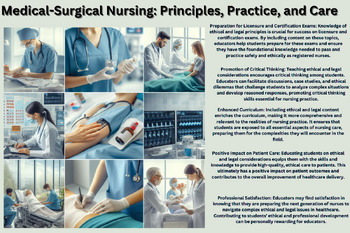Medical-Surgical Nursing: Principles, Practice, and Care
Anthony Okoye
9 Followers
Grade Levels
Higher Education, Adult Education, Homeschool, Staff
Subjects
Resource Type
Formats Included
- PDF
Anthony Okoye
9 Followers
Description
Educators of "Medical-Surgical Nursing: Principles, Practice, and Care" would benefit significantly from incorporating content on ethical and legal considerations into their teaching for several reasons:
- Comprehensive Curriculum: Including ethical and legal considerations enriches the curriculum, ensuring that students receive a well-rounded education that covers all essential aspects of nursing practice. It provides educators with the opportunity to offer a holistic perspective on patient care, going beyond clinical skills to include critical discussions on ethical dilemmas and legal responsibilities.
- Relevance to Practice: Ethical and legal issues are integral to nursing practice, especially in medical-surgical settings where complex patient care scenarios often arise. By addressing these topics, educators help students understand the practical implications of ethical decision-making and legal regulations in their day-to-day practice. This enhances students' preparedness for real-world nursing situations.
- Professional Development: Educators play a crucial role in shaping the professional identity of nursing students. By incorporating content on ethical and legal considerations, they contribute to students' professional development by instilling values of integrity, accountability, and ethical conduct. This equips students with the knowledge and skills necessary to navigate ethical dilemmas and legal challenges they may encounter in their careers.
- Critical Thinking and Problem-Solving Skills: Exploring ethical and legal issues encourages students to engage in critical thinking and problem-solving. Educators can facilitate discussions, case studies, and simulations that challenge students to analyze complex situations, consider different perspectives, and develop reasoned responses. This cultivates students' ability to make ethical decisions and navigate legal complexities in nursing practice.
- Interdisciplinary Collaboration: Ethical and legal considerations often intersect with other healthcare disciplines. Educators can use content on these topics to promote interdisciplinary collaboration and communication among nursing students and students from other healthcare professions. This fosters a team-based approach to patient care and prepares students to work effectively in interdisciplinary healthcare teams.
- Preparation for Licensure and Certification Exams: Knowledge of ethical and legal principles is essential for success on licensure and certification exams, such as the NCLEX-RN. By including content on these topics in their curriculum, educators help students prepare for these exams and ensure they have the foundational knowledge needed to practice safely and ethically as registered nurses.
Overall, integrating content on ethical and legal considerations into the curriculum of "Medical-Surgical Nursing: Principles, Practice, and Care" benefits educators by enhancing the comprehensiveness of the curriculum, fostering professional development in students, promoting critical thinking skills, facilitating interdisciplinary collaboration, and preparing students for licensure and certification exams.
Total Pages
Answer Key
N/A
Teaching Duration
N/A
Report this resource to TPT
Reported resources will be reviewed by our team. Report this resource to let us know if this resource violates TPT’s content guidelines.





